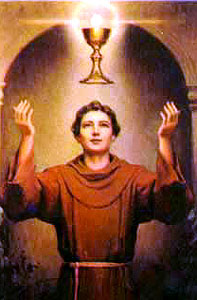5월 17일
성 파스칼 바일론 수도자, 1회
성 파스칼은 1540년 에스파냐에서 태어났고 작은형제회에 입회하였다. 저술활동을 통하여 자신의 영적 체험, 그 중에서도 깊은 성체 신심은 다른 이들에게 많은 도움을 주었다.

St. Paschal of Baylon 1540-1592
Paschal was born on the feast of Pentecost in the year 1540 at Torre Hermosa in Spain. His parents were poor in worldly goods but rich in piety and Christian virtue. The child appeared to be endowed with all the gifts of the Holy Spirit in an eminent degree. He was joyfully attentive and obedient to the good lessons his parents taught him, and he so excelled other children of his age in understanding of the divine truths and zeal for virtue that everybody marveled at it.
As the lowly position of his parents demanded, Paschal, already as a boy, had to tend the cattle of strangers. Although, due to his work, he took no part in the noisy life of the other boys, he was, never the less, well liked by them. They had a certain respect for him, they had him settle their quarrels, and they willingly accepted reprimands from him and listened to the Christian instructions he sometimes gave them.
His employer was so pleased with Paschal, who had meanwhile grown to be a strong young man, that one day he declared to him his intention to adopt him and make him his heir. But the young man answered gratefully that he wished to remain poor and was minded to consecrate himself to the service of God in the religious state.
Later, Paschal moved to another province, and at the age of 24 begged for admission as a lay brother at the convent of the Friars Minor at Monteforte. His request was granted, and Paschal seemed to run the path of perfection with ease and alacrity. He was so humble that he considered himself last of all. At the same time he was so charitable that he cheerfully assumed the most burdensome duties for other brothers. He was so strict with his body that even at the most arduous tasks he would permit himself no relaxation in his way of living. He was so devoted to prayer that he spent all his spare time at it.
On the road, while gathering alms, he always had his rosary in his hand and God in his heart. Paschal fostered special devotion to the Blessed Virgin Mary, whom he called his Mother, and to the Blessed Sacrament, and it proved a constant means to rekindle his zeal.
God showed how pleased He was with his devotion. One day while out-of-doors, Paschal devoutly knelt down to adore the Blessed Sacrament when the bell announced the Consecration. At that moment the Blessed Sacrament was presented to him in a monstrance supported by angels hovering in the air. In the convent church he was frequently found before the tabernacle prostrate or with his arms outstretched, or even rapt in ecstasy. At such times his soul was flooded with light from above. At any rate, the simple brother, who had never learned to read or write, could discourse about the deepest mysteries of religion with marvelous insight to the astonishment of the most learned men.
Because of his heavenly enlightenment the Father Provincial once sent him from Spain on a very important matter to the general of the order, who at the time was staying in France. Paschal made the long and wearisome journey across the Pyrenees barefoot, traveling through regions infested with fanatical heretics, who on several occasions sought the life of the religious brother. But God's angel protected him on the journey to France and back, so that he escaped all danger.
After his return, Paschal remained the same humble brother as before and advanced in every virtue until the day of his happy death. He died at Villareal, on the feast of Pentecost, the feast on which he was born, May 17, 1592. It was during high Mass in the convent church, at the moment of the elevation of the Sacred Host, that Paschal breathed forth his last.
At the funeral, according to custom, the body of the deceased brother lay on an open stretcher in the church. When the Blessed Sacrament was raised in the Requiem Mass, the dead body raised itself, bowed to the Sacred Host, repeating the act of reverence at the elevation of the Chalice, and then lowered itself again. Numerous other miracles occurred at his grave.
Pope Paul V beautified Paschal and Pope Alexander VIII canonized him in the year 1690. Pope Leo XIII in 1897 made him the patron of all Eucharistic societies and congresses.




